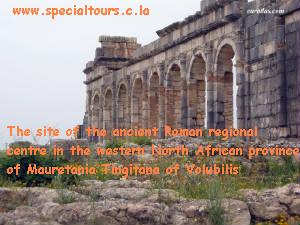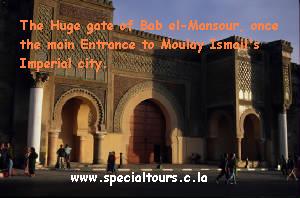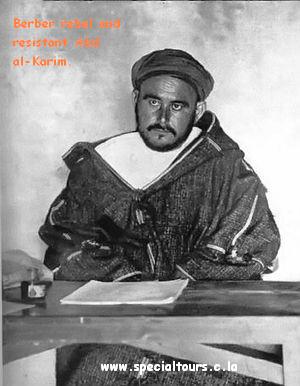|
History:
Morocco is on the edge. It was known to the ancient Arabs
as al-Maghreb al-Aqsa, the Farthest Land of the Setting Sun, alluding to its position on the western extremity of the western
extremity of North Africa. Ancient mariners, medieval conquerors and modern colonisers long sought to tame this land on the
edge. But its rugged terrain and robust tribes endured. It has absorbed the influences of Europe, Africa and Arabia, but Morocco
remains unique.

10,000 - 2500 BC : Ancestors of the Berbers settle in the
Maghreb, a region comprising present-day Morocco, Algeria, Tunisia and Libya.
800 - 300 BC
: Phoenician traders establish staging posts along the North
African coast, including their capital at Carthage.
400 BC
: Emergence of Berber kingdoms of Massyla near Carthage, Masaesyla
on the Algerian coast and Mauretania near Lixus.
146 BC
: Carthageb is destroyed by Rome with the aid of Massyla and
Masaesyla kingdoms; Rome begins its occupation of North Africa.
44 - 33 BC
: With the death of King Bocchus, Rome gains control of Mauretania;
colonies are establsihed at Lixus and Volubilis.
670 - 700 AD
: Arabs sweep across North Africa, establishing a base in central
Morocco; Berber tribes begin to embrace Islam.
780 AD
: Exiled Arab Moulay Idriss establishes the first
Moroccan state, and his successor builds a capital at Fes, thus founding the Idrissid dynasty.

1062 :
The Almoravids of the Sahara establish a capital at Marrakesh
and commence a campaign to conquer northwest Africa and Spain.
1114 - 1269
: The Berber Almohads rule the kingdom from Marrakesh, enjoying
political victories and cultural development.
1269 - 1465
: The Merenids of the Atlas rule from Fes, excelling
in architecture and education.
1415 : Prince Henry the Navigator of Portugal takes Ceuta, the first of many conquests of Moroccon seaports by the Portuguese
and Spanish
|
 |
1492
: Granada is captured, sparking another flood of Muslim and
Jewish immigrants from Andalusia to Morocco.
1524
: After sparring with their rival Wattasids, the Arabian Saadians
establish their capital at Marrakech.
1578
: The Saadian dynasty repels invading Portugal
at the infamous Battle of three kings.
1659
: The last Saadian ruler is assassinated and Moulay ar-Rashid
secures the sultanate, thus founding the Arab Alawite dynasty.
1672 - 1727
: Ar-Rashid's successor Moulay Ismail makes Meknes his
capital and maintains power with legendary cruelty.
1830
: France seizes the Algerian coast, putting increasing pressure on the Moroccan sultan to cede power.
1912
: The Treaty of Fes makes Morocco a French protectorate
with a capital at Rabat; Spain controls northern Morocco from Tetouan

1921 - 26
: Berber rebel Abd al-krim leads resistance against the
Spanish and the French in the Rif War.
1944 - 53
: The Istiqlal Party demands independence from France and nationalist
sentiment grows; Sultan Mohammed V is exiled to Madagascar.
1956
: Morocco becomes an independent nation on 2 March; withh
the repatriated Mohammed V at the helm.
1961 - 99
: After Mohammed V's death, his son Hassan II uses
his rule to modernise the country, yett retains absolute political control.
1975
: The
Green March into the Western Sahara sparks the region's longest-running (and still unresolved) dispute.
1999
: The death of Hassan II and the succession of Mohammed
VI ushers in an era of more liberal social policies and improved human rights.
|

